(共10套)2019适合全国高三高考英语语法专项练习汇总
2019年高考英语全国卷语法填空试题及答案详解

1 2019年高考英语全国卷语法填空试题及答案详解2019全国卷I 阅读下面短文,在空白处填入1个适当的单词或括号内单词的正确形式。
The polar bear is found in the Arctic Circle and some big land masses as far south as Newfoundland. While they are rare north of 88°, there is evidence 61 ______ they range all the way across the Arctic, and as far south as James Bay in Canada. It is difficult to figure out a global population of polar bears as much of the range has been 62 ______ (poor) studied; however, biologists calculate that there are about 20,000-25,000 polar bears worldwide. Modem methods 63______ tracking polar bear populations have been employed only since the mid-1980s,and are expensive employed only since the mid-1980s,and are expensive 64______ 64______ (perform) consistently over a large area. In recent years some Inuit people in Nunavut 65______ (report) increases in bear sightings around human settlements, leading to a 66______ (believe) that populations are increasing. Scientists have responded by 67 ______ (note) that hungry bears may be congregating(聚集) around human settlements, leading to the illusion(错觉) that populations are 68 ______ (high) than they actually are. Of 69______ 69______ nineteen recognized polar bear subpopulations, three are declining, six 70______ (be) stable, one is increasing, 70______ (be) stable, one is increasing, and nine lack enough data. 请看答案及详解:61. that 62. poorly 63. of/for 64. to perform 65. have reported 66. belief 67. noting 68. higher 69. the 70. are 61. that 考查同位语从句。
高考英语真题 2019全国卷一 二 三 语法填词 含答案
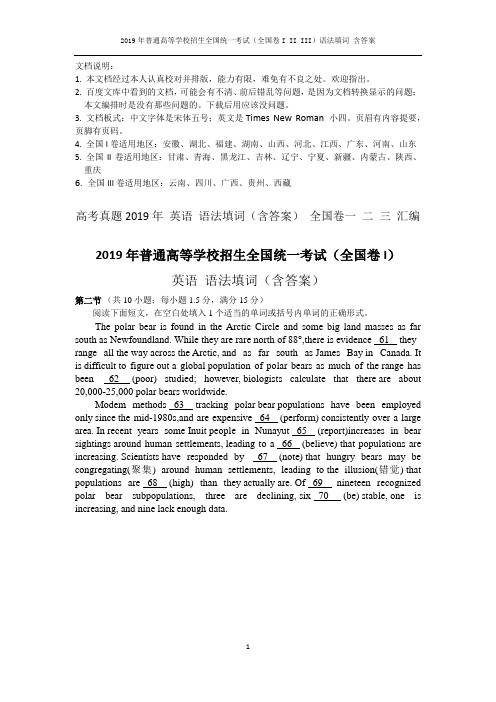
文档说明:1. 本文档经过本人认真校对并排版,能力有限,难免有不良之处。
欢迎指出。
2. 百度文库中看到的文档,可能会有不清、前后错乱等问题,是因为文档转换显示的问题;本文编排时是没有那些问题的。
下载后用应该没问题。
3. 文档板式:中文字体是宋体五号;英文是Times New Roman 小四。
页眉有内容提要,页脚有页码。
4. 全国I卷适用地区:安徽、湖北、福建、湖南、山西、河北、江西、广东、河南、山东5. 全国II卷适用地区:甘肃、青海、黑龙江、吉林、辽宁、宁夏、新疆、内蒙古、陕西、重庆6. 全国III卷适用地区:云南、四川、广西、贵州、西藏高考真题2019年英语语法填词(含答案)全国卷一二三汇编2019年普通高等学校招生全国统一考试(全国卷I)英语语法填词(含答案)第二节(共10小题;每小题1.5分,满分15分)阅读下面短文,在空白处填入1个适当的单词或括号内单词的正确形式。
The polar bear is found in the Arctic Circle and some big land masses as far south as Newfoundland. While they are rare north of 88°,there is evidence 61 they range all the way across the Arctic, and as far south as James Bay in Canada. It is difficult to figure out a global population of polar bears as much of the range has been 62 (poor) studied; however, biologists calculate that there are about 20,000-25,000 polar bears worldwide.Modem methods 63 tracking polar bear populations have been employed only since the mid-1980s,and are expensive 64 (perform) consistently over a large area. In recent years some Inuit people in Nunayut 65 (report)increases in bear sightings around human settlements, leading to a 66 (believe) that populations are increasing. Scientists have responded by 67 (note) that hungry bears may be congregating(聚集) around human settlements, leading to the illusion(错觉) that populations are 68 (high) than they actually are. Of 69 nineteen recognized polar bear subpopulations, three are declining, six 70 (be) stable, one is increasing, and nine lack enough data.2019年普通高等学校招生全国统一考试(全国卷II)英语语法填词(含答案)第二节(共10小题;每小题1.5分,满分15分)阅读下面短文,在空白处填入1个适当的单词或括号内单词的正确形式。
【高考快递】2019届高三英语语法填空题专项训练2 动词 含解析
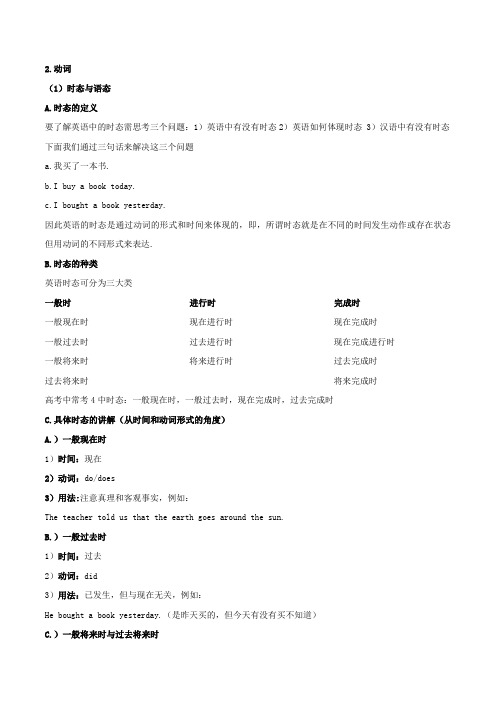
2.动词(1)时态与语态A.时态的定义要了解英语中的时态需思考三个问题:1)英语中有没有时态2)英语如何体现时态 3)汉语中有没有时态下面我们通过三句话来解决这三个问题a.我买了一本书.b.I buy a book today.c.I bought a book yesterday.因此英语的时态是通过动词的形式和时间来体现的,即,所谓时态就是在不同的时间发生动作或存在状态但用动词的不同形式来表达.B.时态的种类英语时态可分为三大类一般时进行时完成时一般现在时现在进行时现在完成时一般过去时过去进行时现在完成进行时一般将来时将来进行时过去完成时过去将来时将来完成时高考中常考4中时态:一般现在时,一般过去时,现在完成时,过去完成时C.具体时态的讲解(从时间和动词形式的角度)A.)一般现在时1)时间:现在2)动词:do/does3)用法:注意真理和客观事实,例如:The teacher told us that the earth goes around the sun.B.)一般过去时1)时间:过去2)动词:did3)用法:已发生,但与现在无关,例如:He bought a book yesterday.(是昨天买的,但今天有没有买不知道)C.)一般将来时与过去将来时1)时间:都发生在将来(区分两个将来)一般将来时是相对于现在的将来,过去将来时是相对于过去的将来,对比:He says that he will go to America next year.He said that he would go to America next year.2)动词:will do/would do3)用法:还未发生.注意“主将从现”的特殊用法在时间状语从句和条件中语从句中可使用“主将从现”,即主语用一般将来时,从句用一般现在时.例如:If you go to the part tomorrow, you will have a good time.D.)进行时1)时间:时间点(具体的时间点或抽象的时间点)He was doing his work at 8:00 yesterday morning.(具体时间点)He was waiting his friends in the airport when I arrived at his home.(抽象时间点)2)动词:be+doing现在进行时:is/am/are doing过去进行时:was/were doing将来进行时:will be doing3)用法:正在做或未完成E.)现在完成时1)时间:过去持续到现在或过去动作对现在造成影响注意:a.持续不可中断:He lived in Beijing for 3 years, but now he lives in Shanghai.b.延续性动词与瞬间动词的转化:He has kept the book for 3 years.(本句中不能用has bought) 2)动词:have/has + done3)用法:动作过去发生但与现在有关4)句型:a. Sine +时间点b. For +时间段c. 主句+sine从句(主语用现在完成时,从句用一般过去时)d. It is/have been+时间+sine从句(从句用一般过去时)e. It is +次数+(that)从句(从句用一般过去时)5)标志词:so far, recently, in the past/last+时间例如:My hometown has changed a lot in the past five years.F.)过去完成时1)时间:过去的过去2)动词:had + doneWhen I arrived at the station, the train had left.It was+次数+(that)+从句(从句用过去完成时)G.)几种易混时态的辨析1).一般现在时与现在进行时(1)一般现在时主要用于习惯性或经常性动作,常伴随使用usually,often,seldom等频度副词;现在进行时主要用于表示目前或现阶段正在进行的动作或状态,常跟now,at present等时间状语.He usually writes a lot of letters,but he isn't writing at present.他经常写许多信,但他现在没在写.(2)表示客观事实或普遍真理时,要用一般现在时,不能用现在进行时.The Earth goes around the Sun.地球绕着太阳转.2).一般过去时与过去进行时(1)一般过去时表示一个完成的动作,而过去进行时表示过去某一阶段正在进行的动作.I was reading a novel last night.昨晚我在看小说(可能没看完).I read a novel last night.我昨晚看了一本小说(已经看完了).(2)一般过去时用于表示一个单纯动作,过去进行时用于表示过去一段时间反复做的动作.Did he ask questions?他提问题了吗?He was asking questions all the time.他始终在提问题.(3)一般过去时表示过去某个时刻发生的动作(侧重说明事实),过去进行时表示过去某一时刻或某一段时间发生的动作(强调在这一过程中所进行的动作或展开的情景).He drew a picture yesterday afternoon.他昨天下午画了一张画(昨天下午他做了这么一件事).He was drawing a picture yesterday afternoon.他昨天下午在画一张画(昨天下午他一直在画画,没干别的事).(3)一般过去时表示过去某个时刻发生的动作(侧重说明事实),过去进行时表示过去某一时刻或某一段时间发生的动作(强调在这一过程中所进行的动作或展开的情景).He drew a picture yesterday afternoon.他昨天下午画了一张画(昨天下午他做了这么一件事).He was drawing a picture yesterday afternoon.他昨天下午在画一张画(昨天下午他一直在画画,没干别的事).3).现在完成时与一般过去时(1)两者都表示发生在过去的动作.但现在完成时表示过去动作与现在的关系,主要说明现在的情况;一般过去时强调动作发生在过去某一时间,与现在不发生联系.例如:They've gone to Paris.他们到巴黎去了(说明他们现在去巴黎了,不在这里).They went to Paris.他们去过巴黎(只说明去过,不表明是否现在仍在那里).(2)现在完成时表示从过去发生到现在一段时间内的任何时间,可与so far,up to now,lately,ever since等表示包括现在一段时间的状语连用,但不能和表示过去时间的状语连用;一般过去时表示的是过去某一特定时间或与现在无关的某一过去时间.I haven't seen the film yet.我还没看过这部影片(到目前为止).I saw the film the day before yesterday.我前天看的这部电影(表明看电影的时间是在前天).4).过去完成时与一般过去时(1)一般过去时通常与具体过去时间状语连用;即使没有时间状语,根据具体的语言环境,我们也可以作出明确的判断.(2)过去完成时是一种相对的时态,表示在过去某时刻之前发生.时间参照点与一般过去时不同,一般过去时是对现在说话时刻而言,过去完成时则是与过去某一时刻而言的,即“过去的过去”.5.一般将来时与将来进行时一般将来时表示对“现在时刻”来说,将要发生的动作或将要存在的状态;而将来进行时表示将来的某一时刻或某段时间正在进行的动作.She is sixteen,who will be seventeen next year.她十六岁,明年将十七岁.What will you be doing at this time next Monday?下周一这时候你将会在做什么呢?5).一般将来时与将来进行时一般将来时表示对“现在时刻”来说,将要发生的动作或将要存在的状态;而将来进行时表示将来的某一时刻或某段时间正在进行的动作.She is sixteen,who will be seventeen next year.她十六岁,明年将十七岁.What will you be doing at this time next Monday?下周一这时候你将会在做什么呢?(2)现在完成进行时往往表示动作在重复,现在完成时则常常不带重复性.如:Have you been meeting her lately?(经常相见)Have you met her lately?(不重复发生)(3)现在完成进行时比较生动,有时含有明显的感情色彩;而现在完成时往往只说明一个事实、一种影响或结果,平铺直叙,没有什么感情色彩可言.如:Recently Mary has been doing her homework regularly.(显然是在表扬玛丽)Recently Mary has done her homework regularly.(只说明一个事实)D. 被动语态1)一般形式Be+done2)具体时态的被动一般现在时的被动:is/am/are+done一般过去时的被动:was/were+done现在完成时的被动:have/has been done过去完成时的被动:had been done3)特殊用法(1)英语中有很多动词,如break,catch,clean,drive,look,open,sell,read,write,wash等,当它们被用作不及物动词来描述主语特征时,常用其主动形式表达被动意义,主语通常是物;在这种情况下,常常和easily,well等副词连用.This kind of cloth washes well.这种布好洗.The sign reads as follows.这牌子告示如下.This material won't wear.这种材料不耐穿.The machine runs well.这种机器运转良好.特别提醒:主动语态表被动强调的是主语的特征,而被动语态则强调外界作用造成的影响.(2)表示感受、感官的系动词feel,sound,taste,look等后跟形容词、名词构成系表结构,无被动形式.Your reason sounds reasonable.你的理由听起来合理.(3)在need,want,require,deserve,bear等动词、worth等形容词的后面,动名词用主动形式表示被动意义,其含义相当于动词不定式的被动形式.The house needs repairing/to be repaired.这所房子需要修理.(4)在某些“主语(人/物)+be+形容词+不定式”中不定式的主动形式表达被动意义.这些形容词有nice,easy,fit,hard,difficult,important,impossible,pleasant,interesting等.The problem is difficult to work out.这道题很难计算出.(可看作to work out省略了for me)(5)be to rent/blame/let也属于主动形式表被动意义.Who is to blame for the mistake?谁应为这个错误接受谴责?The houses are to let.这些房子有待出租.(6)介词in,on,under等+名词构成介词短语表被动意义.表示方位的介词与含动作意义的名词合用,含被动之意,其意义相当于该名词相应动词的被动形式,名词前一般不用冠词.常见的有:under control受控制;under treatment在治疗中;under repair在修理中;under discussion在讨论中;under construction在施工中;beyond belief令人难以置信;beyond one's reach鞭长莫及;beyond one's control无法控制;beyond our hope我们始料不及;for sale出售;for rent出租;in print在印刷中;in sight在视野范围内;on sale出售;on show展出;on trial受审;out of control 控制不了;out of sight超出视线;out of one's reach够不着;out of fashion不流行.如:The rumor is beyond belief(=can't be believed).那个谣言令人难以置信.Today some treasures are on show(=are being shown)in the museum.今天一些珍宝正在博物馆展出.(2)非谓语动词A.非谓语动词与谓语动词的区别形式不同:谓语动词do/does/did,谓语动词的基本功能是做谓语,因此时态语态一定属于谓语动词.非谓语动词doing/to do/done(基本形式),其实质还是动词,但在句子中不做谓语而是做除谓语以外的其他成分.B.非谓语动词的使用范围非谓语一定用在简单句中或复合句的单句中C.非谓语动词的形式(包含变式结构)及意义Doing to do done主动,进行将来,主动被动,完成Being done to be done被动,进行将来,被动Having done主动,完成非谓语的否定是在非谓语前面加not:not doing/not to doViewing from the top of the mountain, I can see a beautiful city.View和主语I是主动关系,所以用doing.Viewed from the top of the mountain, the city is very beautiful.View和主语 the city是被动关系,所以用done.D.不定式的用法1)表将来(分为被动和主动两种形式)2)表目的,一般能翻译为“为了......,来......”就用to doTo get there on time I got up very early.3)表结果,一般用only to doThe reporter hurried to the airport,only to be told the start had left.4)表原因We were very excited to hear the news.5)一些形容词如:difficult, hard, easy,happy,pleasant等后面接to do6)固定句型:it is +adj/n for/of sb. +to doE.非谓语的特殊用法(被动形式表主动意义)和with复合结构1)特殊用法部分过去分词来源于系表结构,作状语时不表示被动关系,其前不用being.这样的过去分词及短语常见的有:seated(坐着的)、hidden(躲着)、stationed(驻扎)、lost/absorbed in(沉溺于)、born in(出身于)、dressed in(穿着)、tired of(厌烦了)等.Lost/Absorbed in deep thought,he didn't hear the sound.2)With复合结构with复合结构(with+宾语+宾语补足语)作状语,是用现在分词、过去分词还是动词不定式作宾语补足语,关键是看宾语和宾语补足语之间的关系.With time passing by(time和pass之间为主动关系),he almost forgot everything in the past.随着时间的流逝,他几乎忘记了过去所有的事情.He sat on the chair,with his hands tied(hands和tie之间为被动关系)behind his back.他坐在椅子上,双手在背后捆着.3)独立主格如果分词作状语的逻辑主语不是句子的主语,须在分词前面加上它自己的主语,这种结构叫独立主格结构,其作用相当于状语从句;有时也用with复合结构(with+宾语+宾语补足语)作状语.(1)名词/主格代词+现在分词名词/主格代词与现在分词之间是主谓关系.The girl staring at him(=As the girl stared at him),he didn't know what to say.女孩两眼望着他,他不知道说什么好.(2)名词/主格代词+过去分词名词/主格代词与过去分词之间是动宾关系.The problems solved(=As the problems were solved),the quality has been improved.随着问题的解决,质量已经提高了.(3)名词/主格代词+不定式名词/主格代词与不定式之间是主谓关系,且强调的是一次具体性的动作.He is going to make a model plane,some old parts to help.借助于一些旧零件,他要做一个飞机模型.F.动词后接doing和to do 的区别注意1.动名词作宾语时,可以带逻辑主语.此时,逻辑主语可以是物主代词、人称代词的宾格或所有格.Do you mind my/me reading your paper?你介意我看你的考卷吗?2.作宾语的动名词和不定式除了一般式和主动式,还有完成式、被动式. 完成式表示该动作比谓语动作先发生.否定式在doing/to do前加not.(1)I regret not having taken her advice.(not须放在having前)我感到遗憾,没有听从她的建议.(2)They couldn't stand being treated like that.他们不能忍受被那样对待.(3)He decided to help me but I pretended to have finished my job.他决定帮我,但我假装已经完成工作了.G.高考中常见非谓语固定搭配(1)afford,agree,choose,determine,expect,decide,learn,offer,manage,hope,want,wish,promise,refuse,fail,pretend,happen等动词后跟不定式作宾语.(2)appreciate,avoid,bear,consider,dislike,delay,enjoy,escape,finish,hate,imagine,keep,mind,miss,practise,postpone,resist,risk,stand,suggest等动词后跟动名词作宾语.(3)情态动词与虚拟语气A.情态动词1)情态动词基本含义一、can/could与be able to1.can/could用来表示“一般能力”;be able to有多种时态,且用来表示在特定条件下的“具体能力”.如:My grandma is over seventy,but she can still read without glasses.They will be able to tell you the news soon.He was able to flee Europe before the war broke out.2.表示允许可用can或could,与may/might意义接近.could可用于现在时,只是语气更加委婉、客气,回答时则一般要用can而不用could.—Could I have the television on?—Yes,you can./No,you can't.二、may与might1.表示允许,意为“可以,许可”,用法基本上同can与could.如:May I use your bicycle?2.表示可能性,意为“也许,可能”.如:According to the weather forecast, it may rain tomorrow.3.may可以放在句首,表示祝愿.如:May good luck be yours!三、must与have to1.must用来表示说话人的主观看法;have to表示客观的需要,强调外界压力,不得已而为之.如:He said that they must work hard.他说他们必须努力工作.(主观上要做这件事)My brother was ill, so I had to call the doctor in the middle of the night.我弟弟生病了,我只得半夜里把医生请来.(客观上需要做这件事)2.表示“不必”,须用don't have to或needn't.must的否定式表示“禁止,绝对不可”.如:You don't have to tell him about it.你不必告诉他那件事.You mustn't tell him about it.你绝不能告诉他那件事.—Must we do it now?我们必须现在做吗?—No, you needn't.不,你们不必.四、shall1.用于第一、第三人称的疑问句中,用来征求对方的意见或请求指示.如:What shall he do next?他下一步干什么呢?2.用于第二、第三人称的陈述句中,表示说话人的意愿,有“命令、警告、允诺、威胁、强制”等意思.如:He shall stay in bed.他必须躺在床上.You shall have it back next week.下周一定还你.He says he won't go, but I say he shall.他说他不去,但我说他必须去.五、will与would1.will用于各种人称,表示“意志、意愿”或“决心”等.如:If you will keep your watch half an hour slow, it is hardly surprising that you are late for your appointments.如果你想要让你的表慢半个小时,你约会时迟到就不足为怪了.2.will表示习惯性的动作,有“总是,惯于”的含义.如:An Englishman will usually show you the way in the street.英国人通常是会在街上给你指路的.3.would可表示过去反复发生的动作.如:On Sundays he would get up early and go fishing.星期天他总是早起去钓鱼.六、should与ought to1.should表示“建议”或“劝告”,有“应该”之意.如:You should learn from each other.2.ought to表示根据某种义务或必要“应当”做某事.如:Everyone ought to obey the traffic regulations.3.should和ought to也可用来表示推测,意为“想必会……”.如:—When can I come for the photos? I need them tomorrow afternoon.—2)情态动词表推测1.can用于肯定句中表示客观的可能性,意为“有时会”;用于疑问句中可以表示推测,意为“可能”,有时表示一种惊讶的语气;用于否定句中也可以表示推测,can't意为“不可能”,语气很强烈.It is usually warm in my hometown in March, but it can be rather cold sometimes.我的家乡在三月份通常很暖和,但有时候也会相当冷.Mr. Bush is on time for everything. How can it be that he was late for the meeting?布什先生做什么事情都很准时,他怎么可能开会迟到呢?—Let's visit Tom together, Stephen.—There's no need to do so. He can't be at home, because I saw him board the flight to Beijing this morning.——Stephen,咱们一起拜访汤姆吧.——没必要这样做.他一定不在家,因为今天早晨我看见他登上了飞往北京的航班.2.may/might用于肯定句中可以用来表示不十分肯定的推测,意为“有可能”;用于否定句中也可以表示推测,may not意为“可能不”,表示一种不太确定的语气.The traffic is heavy these days. I might arrive a bit late, so could you save me a place?这些天交通很繁忙,我可能会来晚一点,请你帮我保留个位置好吗?3.must表示推测时只能用于肯定句中,意为“一定,必定”,表示十分肯定的语气(在疑问句中或否定句中要用can/could).—It's the office! So you must know eating is not allowed here.—Oh, sorry.——这是办公室!所以你一定知道这里不许吃东西.——噢,对不起.4.should用来表示推测时意为“应该”,即含有“按道理来说应当如此”的意思.There shouldn't be any difficulty about passing the road test since you have practiced a lotin the driving school.因为你在驾校训练了这么多,通过路考应该没什么困难.3)情态动词+have done1.should/ought to+have done,表示“过去本应该做而(实际)没有做的事情”,含有责备或遗憾的语气,意为“本应该……”.其否定形式为“should not/ought not to have+done”,表示某种行为本不该发生但实际上发生了.I shouldn't have watched that movie—it'll give me horrible dreams.我本不应该看那部电影——它会令我做噩梦.You ought to have come to the party yesterday, but why didn't you come?昨天你本来应该参加聚会的,可是你为什么不来?2.must+have done,用于肯定句,表示“过去一定做过某事”,表示一种很有把握的推测.注意,对过去发生的情况的否定推测常用“can't/couldn't+have done”表示.—Ye Shiwen won two gold medals in London Olympic Games.—She must have gone through tough training.——叶诗文在伦敦奥运会获得了两枚金牌.——她肯定受到严格的训练.—Do you know where David is? I couldn't find him anywhere.—Well. He can't have gone far—his coat's still here.——你知道大卫在哪里吗?我到处找不到他.——大卫的上衣还在这里,因此他肯定没走远.3.needn't+have done,表示“过去没有必要做某事,但实际上做了某事”.Mark needn't have hurried. After driving at top speed, he arrived half an hour early.马克本没必要那么匆忙.他以最快速度开车,结果早到了半个小时.4.may/might+have done,表示对过去情况的一种不太有把握的可能性的推测,表示“可能已做了某事……”,否定句表示“可能还没有……”.Sorry, I'm late. I might have turned off the alarm clock and gone back to sleep again.对不起,我迟到了.我可能把闹钟关掉后又睡着了.5.could+have done表示“过去本来可以做某事,但实际上没有做”;can/could+have done表示“过去可能做了某件事”.I could have saved the poor rabbit, but I didn't have the right drugs with me at that moment.我本来可以拯救那只可怜的兔子的,可是我当时没有合适的药品.B.虚拟语气一、虚拟语气在虚拟条件句中的用法1.在具体运用中,条件从句中有时可省略if而采用倒装结构.如:Had it not been for your help, we wouldn't have achieved so much.2.介词without/but for、连词but、副词otherwise常用来表示某种假设条件.如:I wouldn't have made such rapid progress without your help.3.有时候从句动作和主句动作发生的时间不一致,这时谓语动词的形式要根据各自的时间来调整.如:If the weather had been more favourable, the crops would be growing still better.二、“should+动词原形”表示的虚拟语气这一类型常见词有“一坚持(insist)、二命令(order, command)、三建议(advise, suggest, propose)、四要求(request, require, demand, desire)”.以上词及其派生名词所接的名词性从句都使用“(should +)动词原形”的虚拟语气.①Jane's pale face suggested that she was ill, and her mother suggested that she(should) havea medical examination.简苍白的脸色表明她病了,她母亲建议她去检查身体.②She insisted that the man had stolen her car and that he(should) be sent to prison.她坚持说那个男人偷了她的车,并坚决要求他坐牢.三、特殊句式中的虚拟语气If only/It's (high) time (that)...wish/would rather/as if等固定句式要求用相应的虚拟语气表达形式.①I wish I could f ly.真希望我能飞.②I would rather you came tomorrow.我宁愿你明天来.③If only I had taken your advice!要是听从了你的建议该多好啊!(4)主谓一致主谓一致的考察只能体现为对be动词或原形三单的考察A.两个常考原则1)就近原则这一原则是指,谓语动词的人称和数常常与最近作主语的词语保持一致.常出现在这类句子中的连词有:or, either… or …,neither… nor …,not only… but also …等.例如:Either I or they are responsible for the result of the matter.不是我,就是他们要对那件事的结局负责任.Neither the unkind words nor the unfriendly attitude has caused me any distress.既不是那些不友好的话,也不是那不友好的态度让我沮丧.Not only he but also all his family are keen on concerts.不仅仅是他,而且是他全家人都很热衷于音乐会.Neither his family nor he knows anything about it.他全家人和他都不知道那件事.2)就远原则当主语后面接由as well as, as much as, accompanied by, including in addition to, more than,no less than, rather than, together with, with等引导的词组时,谓语动词这些词与前面的主语保持一致.Petroleum, along with fuel gas, has recently risen in price.最近石油和燃料煤气的价格上涨了.The teacher, with all his students, is going to have a picnic this weekend.老师打算这个周末与学生们一起去野炊.The students, together with their teacher, are going to have a picnic this weekend.学生们打算这个周末与他们的老师一起去野炊.The warehouse, with all its stockings, was burned last night.昨晚,那个仓库连同其所有的货物一起被烧毁了.B.并列主语的主谓一致1.两个单数名词用and连接,表示两个不同的概念时,谓语动词常用复数形式.如:Tom and Jack were close friends.汤姆和杰克是亲密的朋友.2.两个单数名词用and连接,表示同一人、同一物、同一个概念或表示不可分割的整体时,谓语动词仍用单数形式.如:The singer and dancer is to attend our evening party.那位歌舞演员将参加我们的晚会.3.被every, each, many a, no等限定的单数名词由and连接时,谓语动词仍用单数形式.其中,后一个限定词可省略.如:Each boy and (each) girl has an apple.每个男孩和每个女孩都有一个苹果.4.一个单数名词被几个用and连接的并列形容词修饰时,可以指一件事或几件事,这种名词作主语,要根据意义一致的原则决定谓语动词的数.如:What he says and does do not agree.他言行不一致.Simple and plain living is a fine quality.生活俭朴是一种优良的品质.English and American literature are appealing to her.英国文学和美国文学都对她有吸引力.5.由and连接的两个what从句作主语时,要根据意义一致的原则决定谓语动词的数.如:What he says and does does not concern me.他的言行与我无关.6.由or, nor, either...or,neither...nor, not only...but (also)连接的并列主语,通常根据就近原则,谓语动词的单复数形式要和与它邻近的主语的数保持一致.如:One or two friends are coming this evening.今天晚上有一两个朋友要来.Neither I nor he is in favour of her marriage.我和他都不赞成她的婚姻.7.“单数名词+with, along with, together with, as well as, rather than, as much as, but, except等+名词”作主语时,谓语仍用单数形式. 如:Dr. Smith, together with his wife, is to arrive on the evening flight.史密斯博士及其夫人将乘晚班飞机抵达.Nobody but one teacher and three students was in the laboratory.除了一个老师和三个学生外,没有人在实验室里.C.某些名词作主语时的主谓一致1.集体名词family, class, crew, team, group, public, audience, crowd, government, committee 等作主语时,动词的单复数形式要根据主语所指的意义而定.当把集体名词作为一个整体看待时,谓语动词常用单数形式;如果指其中各个成员时,谓语动词常用复数形式.如:The class consists of 25 boys and 20 girls.这个班由25个男生和20个女生组成.The class are doing experiments.全班学生正在做实验.2.由两部分构成的表示物体的名词,如trousers, pants, jeans, compasses, glasses, shorts等作主语时,谓语动词常用复数形式.但如果这类名词前用了a pair of或two/three/...pairs of来修饰,谓语动词的数往往取决于pair的单复数形式.如:Your glasses are very nice.你的眼镜很漂亮.This pair of trousers is mine.这条裤子是我的.。
【高考快递】2019届高三英语语法填空题专项训练9 句型结构 含解析

(1)疑问句疑问句包括:一般疑问句,特殊疑问句,选择疑问句,反义疑问句.在高考语法考试中一般不是重点.注意:反义疑问句1.主从复合句,与主句的主谓语保持一致.但当陈述部分是I (We) think/believe/expect/suppose 加从句时,疑问句应和从句的人称时态保持一致.2.must表示猜测时的反意疑问句“must be”对现在情况进行推测作一般现在时或现在进行时的附加疑问句进行处理.3.陈述部分是祈使句,疑问尾句用will you;但如果陈述部分是let's开头的祈使句,疑问尾句用shall we.(2)倒装句A.倒装句的分类英语中的句序分为两种:自然句序(即陈述句)和倒装句判断二者的依据:主语和动词的位置关系陈述句是动词在主语之后,倒装句是主语在动词之后倒装句分为三类:部分倒装,完全倒装,形式倒装B.倒装句的规则1)完全倒装谓语动词完全放在主语之前的句子便是完全倒装句.这类句型主要有:1.表示方式、方位的副词或介词短语,如here, there, up, down, in, away, off, out, in the room, on the wall等,置于句首,且主语是名词时.如:In a lecture hall of a university in England sits a professor.在英格兰一所大学的讲堂里坐着一位教授.South of the river lies a small factory.一个小型工厂坐落在河的南岸.Out rushed the children.孩子们冲了出去.2.such置于句首时.如:Such was Albert Einstein, a simple man and the 20th century's greatest scientist.这就是艾伯特·爱因斯坦,一个朴实的人,也是20世纪最伟大的科学家.只把谓语的一部分(多为助动词或情态动词)置于主语之前的句子叫部分倒装句.这类句型主要有三种:1.only修饰副词、介词短语或状语从句,且放在句首时.如:Only in this way can we learn English well.只有以这种方法,我们才能学好英语.Only when he returned did we find out the truth.只有当他回来时,我们才查明了真相.使用特点:(1)在部分倒装句中,如果谓语部分无助动词,则须找助动词来“帮助”它构成倒装句.如:(×)Only after the war learned he the sad news.(√)Only after the war did he learn the sad news.只是在战后他才知道那个悲惨的消息.(2)only修饰状语从句时,从句不可倒装.如:(×)Only when did he return did we find out the truth.(√)Only when he returned did we find out the truth.只有当他回来的时候,我们才查明了真相.(3)only修饰主语时,句子不可倒装.如:(×)Only can he answer the question.(√)Only he can answer the question.只有他能回答这个问题.2.否定副词never, nor, not, hardly, little, seldom, scarcely, rarely及表否定意义的介词短语at no time, under/in no circumstances, in no case, by no means, on no condition等置于句首时.如:Never before have I seen such a moving film.=I have never seen such a moving film before.以前我从未看过这么感人的电影.Not a single mistake did he make.=He didn't make a single mistake.他一个错也没犯.3.七个重要的固定句型:(1)...so+be/助动词/情态动词+主语“……也是如此”.如:They love having lots of friends; so do those with disabilities.他们喜欢交很多朋友,那些有残疾的人也是如此.注意:如果句意不是“……也是如此”,而仅是对前面内容的肯定或附加(此时的so=indeed),那么,句子不可使用倒装形式.试比较:A:I was afraid. (句中的I指是说话者A)B:So was I. (I指的是B,此句意为:I was afraid, too.)A:我害怕.B:我也是.A:I was afraid. (I指的是A)B:So you were.(you指的也是A.此句意为:Indeed you were afraid.)A:我害怕.B:你就是这样.(2)...neither(或nor)+be/助动词/情态动词+主语“……也不这样”.如:Lily can't ride; neither (或nor) can Lucy.莉莉不会骑车,露西也不会.此句型中的neither(或nor)不可用so...not替代,但可用not...either改写.如:(×)I have never been abroad. So hasn't he.(√)I have never been abroad. Neither/Nor has he.(√)I have never been abroad. He has never/not been abroad, either.我没出过国,他也没有.(3)So+adj./adv....that.../Such+adj.+n....+tha t...“如此……以至于……”.如:So clearly does he speak English that he can always make himself understood.他说英语如此清晰以至于别人都听得懂.注意:在这个句型中,so/such引导的句子要倒装,而that引导的句子不倒装.(4)Neither...,nor...“……不……,……也不……”.如:Neither do I know it, nor do I care about it.我不知道,也不关心.注意:由于neither和nor都是否定词,所以其后面的分句均需倒装.(5)Not only...,but also...“不仅……而且……”.如:Not only will help be given to people to find jobs, but also medical treatment will be provided for people who need it.不仅要给那些找工作的人提供帮助,而且也要给那些需要帮助的人提供医疗保健服务.注意:此句型也可写成Not only...but...或Not only...but...as well的形式,但but (also)引导的句子必须用正常语序.(6)Not until...“直到……才……”.如:Not until he returned did we have supper.直到他回来我们才吃晚饭.注意:①这句话可以改写成:We didn't have supper until he returned.再如:=He can直到凌晨4点他才睡着.②如果not until引导的是句子,until从句不可倒装,只是主句需要倒装.(7)hardly...when...,no sooner...than...“刚……就……”等引导两个句子时,前一个句子用部分倒装,后一个句子不倒装.Hardly/Scarcely had he heard the news when he began to cry.他一听到这个消息就哭了.3)形式倒装形式上的倒装在语法上称为前置.它的特点是,只把强调的内容提至句首,主谓并不倒装.这样的结构较多,但尤其要注意as, though引导让步状语从句时采用形式倒装的情况.1.表语的倒装Tired as/though he was, he still went on with his work.尽管他很累,他还是继续工作.2.谓语动词的倒装Try as he might,he didn't pass the exam.尽管很用功,但他考试还是不及格.3.状语的倒装Much as he likes the bike, he doesn't want to buy it.他虽然很喜欢那辆自行车,但不想买它.注意:如果是单数名词或形容词的最高级作表语,不再用冠词.如:Child as he is, he knows a lot.尽管他是孩子,但他懂得很多.Youngest as he is in our class, he speaks English the best.他虽然是我们班年龄最小的,但英语说得最好.(3)感叹句What和how引导What后有名词,how后面没有名词注意:特殊易混句How interesting the book is.句中要用how,不能用what.(4)强调句A.基本结构和判断方法基本结构:It is/was+被强调部分+that+句子剩余成分被强调的可以是单词、短语,也可以是从句,但结构必须完整.被强调的成分可以是主语、宾语和状语,但不能是定语或谓语.如:It is I who/that am right.我才是对的.(强调主语)判断方法:把it is/was和that去掉,剩余部分是完整的才是强调句,比较:It is in the park that I meet you(强调句)It is the park were I meet you.(定语从句)B.特殊句式的强调Was it in 1939 that the Second World War broke out?第二次世界大战是在1939年爆发的吗?When was it that you called me yesterday?你昨天给我打电话是什么时候?What is it that you want me to do?你要我做什么?I didn't realize she was a famous film star until she took off her dark glasses.→It was not until she took off her dark glasses that I realized she was a famous film star.直到她摘掉墨镜我才认出她是著名影星.C.对谓语动词的强调用助动词do,does或did来强调谓语动词,用于一般现在时和一般过去时的肯定的陈述句中,do还可以用于祈使句.Do be careful while crossing the street.过马路时一定要当心.(5)祈使句祈使句的固定句式1.祈使句+and+句子表示“如果……就……”2.祈使句+or+句子表示“……否则……”。
(完整)语法填空-2019年高考真题.doc
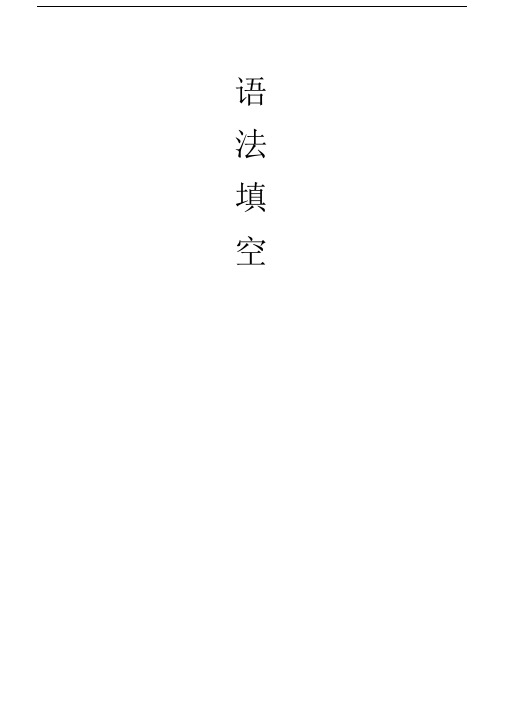
语法填空2019 年高考英语真题和模拟题分项汇编专题 08 语法填空一、 2019 年高考真题I.记叙文1.【 2019 ·全国卷 I 】阅读下面短文,在空白处填入 1 个适当的单词或括号内单词的正确形式。
The polar bear is found in the Arctic Circle and some big land masses as far south as Newfoundland. Whilethey are rare north of 88,there is°evidence ___61___ they range all the way across the Arctic, and as far south as James Bay in Canada. It is difficult to figure out a global population of polar bears as much of the range has been___62___ (poor) studied; however, biologists calculate that there are about 20,000-25,000 polar bears worldwide.Modem methods ___63___ tracking polar bear populations have been employed only since the mid-1980s, and are expensive ___64___ (perform) consistently over a large area. In recent years some Inuit people in Nunayut___65___ (report) increases in bear sightings around human settlements, leading to a ___66___ (believe) that populations are increasing. Scientists have responded by ___67___ (note) that hungry bears may be congregating( 聚集 ) around human settlements, leading to the illusion( 错觉 ) that populations are ___68___ (high) than they actually are. Of ___69___ nineteen recognized polar bear subpopulations, three are declining, six ___70___ (be) stable, one is increasing, and nine lack enough data.【篇解】本文科普文明文,介了北极熊的生存状。
2019北京师大高考信息卷10套英语分类汇编——语法填空
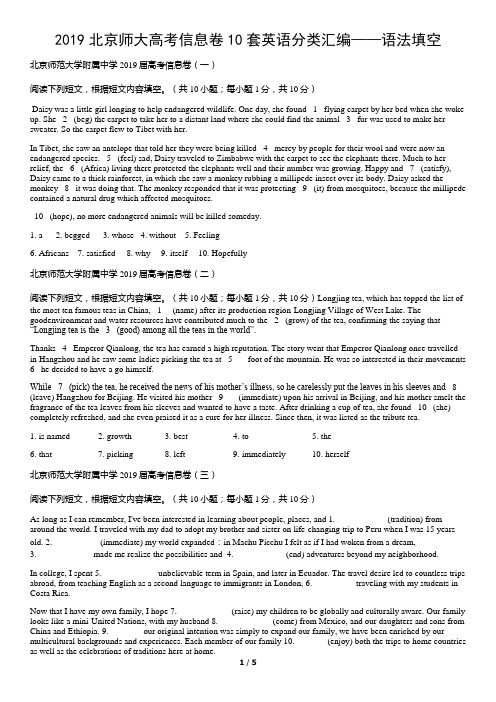
2019北京师大高考信息卷10套英语分类汇编——语法填空北京师范大学附属中学2019届高考信息卷(一)阅读下列短文,根据短文内容填空。
(共10小题;每小题1分,共10分)Daisy was a little girl longing to help endangered wildlife. One day, she found 1 flying carpet by her bed when she woke up. She 2 (beg) the carpet to take her to a distant land where she could find the animal 3 fur was used to make her sweater. So the carpet flew to Tibet with her.In Tibet, she saw an antelope that told her they were being killed 4 mercy by people for their wool and were now an endangered species. 5 (feel) sad, Daisy traveled to Zimbabwe with the carpet to see the elephants there. Much to her relief, the 6 (Africa) living there protected the elephants well and their number was growing. Happy and 7 (satisfy), Daisy came to a thick rainforest, in which she saw a monkey rubbing a millipede insect over its body. Daisy asked the monkey 8 it was doing that. The monkey responded that it was protecting 9 (it) from mosquitoes, because the millipede contained a natural drug which affected mosquitoes.10 (hope), no more endangered animals will be killed someday.1. a2. begged3. whose4. without5. Feeling6. Africans7. satisfied8. why9. itself 10. Hopefully北京师范大学附属中学2019届高考信息卷(二)阅读下列短文,根据短文内容填空。
2019年高考英语语法填空真题汇编

2019年高考英语语法填空真题汇编(精选真题试卷+详细解题技巧与过程,值得下载打印练习)一、语法填空(共4题;共40分)1.(2018•卷Ⅰ)阅读下面短文,在空白处填入1个适当的单词或括号内单词的正确形式。
According to a review of evidence in a medical journal runners live three years________(long) than non-runners You don't have to run fast or for long________(see)the benefit You may drink, smoke, be overweight and still reduce your risk of ________(die)early by running.While running regularly can make you live forever, the review says it ________ (be)more effective at lengthening life ________walking ,cycling or swimming. Two of the authors of the review also made a study published in 2014 ________showed a mere five to 10 minutes a day of running reduced the risk of heart disease and early deaths from all ________(cause).The best exerc ise is one that you enjoy and will do. But otherwise ……It's probably running. To avoid knee pain, you can run on soft surfaces to ________(strength)your leg muscles(肌肉),avoid hills and get good running shoes. Running is cheap, easy and it's always________(energy). If you are time poor, you need run for only half the time to get the same benefits other sports, so perhaps we should all give ________a try.【答案】longer;to see;dying;is;than;that/which;causes;strengthen;energetic;it/running【考点】语法填空【解析】【分析】这是一篇议论文,谈论跑步带来的好处。
全国通用版2019高考英语三轮冲刺提分练语法练第4练介词
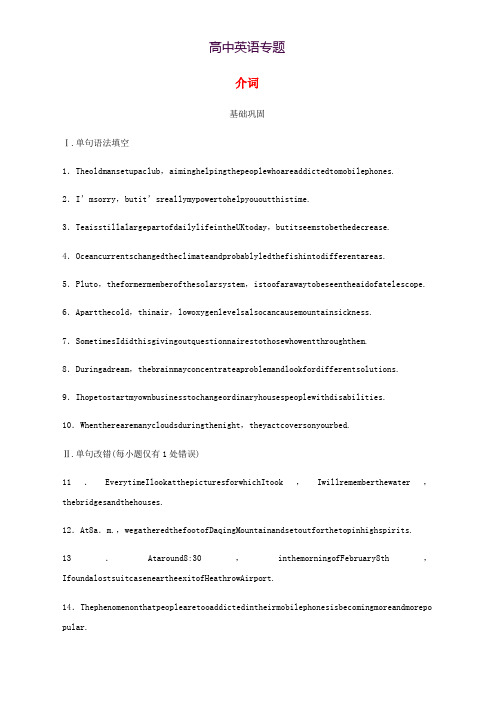
介词基础巩固Ⅰ.单句语法填空1.Theoldmansetupaclub,aiminghelpingthepeoplewhoareaddictedtomobilephones.2.I’msorry,butit’sreallymypowertohelpyououtthistime. 3.TeaisstillalargepartofdailylifeintheUKtoday,butitseemstobethedecrease. 4.Oceancurrentschangedtheclimateandprobablyledthefishintodifferentareas. 5.Pluto,theformermemberofthesolarsystem,istoofarawaytobeseentheaidofatelescope. 6.Apartthecold,thinair,lowoxygenlevelsalsocancausemountainsickness. 7.SometimesIdidthisgivingoutquestionnairestothosewhowentthroughthem. 8.Duringadream,thebrainmayconcentrateaproblemandlookfordifferentsolutions. 9.Ihopetostartmyownbusinesstochangeordinaryhousespeoplewithdisabilities. 10.Whentherearemanycloudsduringthenight,theyactcoversonyourbed.Ⅱ.单句改错(每小题仅有1处错误)11.EverytimeIlookatthepicturesforwhichItook,Iwillrememberthewater,thebridgesandthehouses.12.At8a.m.,wegatheredthefootofDaqingMountainandsetoutforthetopinhighspirits. 13.Ataround8:30,inthemorningofFebruary8th,IfoundalostsuitcaseneartheexitofHeathrowAirport. 14.Thephenomenonthatpeoplearetooaddictedintheirmobilephonesisbecomingmoreandmorepo pular.15.Firstly,youcansharewithefficientlearningexperiencetopromoteyourEnglishstudy. 16.Theysaytheyhavelearnedwhatisnottaughtintextbooksandhavegotagreatdealpractice. 17.Ifyoufindapositionatthere,I’msureyou’llhavearapidimprovementinbothyourcharacterandability. 18.Wecanlieonthegrassforarest,orsitbythelakelisteningmusic.19.We’dliketomeetyouattheschoolgateat5:50onthisevening. 20.Iwilltakeyoutogethertoahotpotrestaurantfordinnerandwe’lltalkwithourplanforthe weekend.技法总结在语法填空中如果空格后是名词、代词或动名词,且它们在句中不是作主语、表语或动词的宾语时,这个空格就很可能是填介词。
- 1、下载文档前请自行甄别文档内容的完整性,平台不提供额外的编辑、内容补充、找答案等附加服务。
- 2、"仅部分预览"的文档,不可在线预览部分如存在完整性等问题,可反馈申请退款(可完整预览的文档不适用该条件!)。
- 3、如文档侵犯您的权益,请联系客服反馈,我们会尽快为您处理(人工客服工作时间:9:00-18:30)。
(共10套)2019高三高考英语语法专项练习汇总专题一构词法[全国卷考情分析](对应学生用书第241页)形容词变副词的后缀[先试做题组]Ⅰ.单句语法填空1.(2017·江西红色七校一联)He sat down and started gently(gentle) talking to the dog.2.Similarly(similar),when Ron Webster borrowed a book from the library of the University of Liverpool,he forgot to return it,too.3.But such a small thing couldn't possibly(possible)destroy a village.Ⅱ.单句改错1.Parents and teachers always think students should spend more time on their studies,but students themselves think different.different→differently 2.(2017·宿迁三校质检)She tore up the letter angry and threw it into the dustbin.angry→angrily 【44040110】[再解读要点]变化形式例词一般情况下直接加“-ly”quick→quickly fluent→fluently stupid→stupidly少数以e结尾的形容词,要去掉e再加-ly;绝大多数辅音字母加e结尾的形容词直接加-ly true→truly polite→politely wide→widely wise→wiselynice→nicely以“y”结尾的,且读音为/I/, 先将“y”改成“i”,再加“ly”;但是如果读音为/aI/, 直接加ly happy→happily heavy→heavily angry→angrily busy→busily dry→dryly shy→shyly以ic结尾的词,加ally economic→economically basic→basically(例外:public→publicly)以辅音字母加le结尾时,去e加y;元音字母加le时,直接加ly simple→simply terrible→terribly gentle→gently possible→possibly probable→probably sole→solely (例外:whole→wholly)形容词变名词的后缀[先试做题组]Ⅰ.单句语法填空1.My English improved a lot;more importantly,I gained muchconfidence(confident).2.That little act of kindness(kind) made everyone who saw it feel good-but it made me feel the best of all!Ⅱ.单句改错(2017·山东师大附中月考)We fear that we do not have the strong and courage to face the truth of our situation.strong→strength[再解读要点]动词、名词变形容词的后缀[先试做题组]Ⅰ.单句语法填空1.The high-speed train that connects the two cities is both fast and comfortable(comfort).2.Not only the teachers but also the students find the website beneficial(benefit).3.(2017·安徽江南十校联考)He was more than just an English teacher,because he also taught me useful(use) lessons in life. 【44040111】Ⅱ.单句改错1.Most people nowadays are so busy with their lives that they do not have time to enjoy a healthy and balance diet.balance→balanced2.(2017·黑龙江大庆调研)I don't think it a reason practice for them to behave that way in our society.reason→reasonable[再解读要点]后缀例词able accept→acceptable可接受的comfort→comfortable舒适的fashion→fashionable时髦的suit→suitable合适的reason→reasonable有道理的-al benefit→beneficial有益的music→musical音乐的origin→original最初的person→personal个人的;私人的center→central中央的;中心的nature→natural自然的;天生的form→formal正式的impress→impressive给人深刻印象的instruct→instructive有教育意义的expense→expensive昂贵的-ous continue→continuous不断的;持续的anxiety→anxious忧虑的caution→cautious十分小心的;谨慎的curiosity→curious好奇的humor→humorous幽默的some tire→tiresome令人厌倦的trouble→troublesome麻烦的-y taste→tasty美味的;可口的health→healthy健康的wealth→wealthy富裕的;丰富的dirt→dirty有灰尘的;脏的rain→rainy有雨的sun→sunny阳光明媚的cloud→cloudy阴天的-ern east→eastern东方的;向东的west→western西方的;向西的-ish child→childish孩子气的fool→foolish愚蠢的;可笑的self→selfish自私的ic science→scientific科学的economy→economic经济的history→historic历史上著名的动词变名词的后缀[先试做题组] Ⅰ.单句语法填空1.(2017·山东泰安一模)It is necessary to have a physical examination(examine) every year.2.Annan will be remembered for his ability and his warmth(warm).3.Without hesitation(hesitate),I decided to follow them and we did have lots of fun that day.Ⅱ.单句改错(2017·湖北八校联考)It is a very effective way to learn the language and improve your pronounce.pronounce→pronunciation 【44040112】[再解读考点]-ing hear→hearing听力;听觉begin→beginning开始-ure/ture fail→failure失败press→pressure压力mix→mixture混合;混合物depart→departure离开;出发-y recover→recovery恢复;痊愈discover→discovery发现其他choose→choice选择vary→variety多样化;种类tend→tendency趋向;趋势变动词的前缀与后缀[先试做题组]Ⅰ.单句语法填空1.You should loosen(loose) up your muscles before playing any sport.2.My mother encouraged(courage) me and insisted that I continue my education.3.Our government attaches much importance to education now,which enables(able) so many people to be well educated.Ⅱ.单句改错1.If you want to live a simple life,you need to simple your mind.第二个simple→simplify2.If you deep your knowledge or understanding of a subject,you will learn more about it and become more interested in it.deep→deepen[再解读考点]前/后缀例词前缀en-able→enable使能够large→enlarge扩大rich→enrich使充实;使丰富danger→endanger危及courage→encourage鼓励后缀enbroad→broaden使变宽ripe→ripen使成熟sharp→sharpen使尖锐wide→widen加宽short→shorten变短deep→deepen加深dark→darken使变暗hard→harden使变硬ifyclass→classify把……分类just→justify证明……正确simple→simplify简化beauty→beautify美化izeapology→apologize道歉emphasis→emphasize强调memory→memorize记住real→realize认识到;实现表示否定意义或相反意义的前缀和后缀[先试做题组]Ⅰ.单句语法填空1.(2017·山东青岛一模)As they couldn't play outdoors,they were unhappy(happy),and some even got into fights from time to time.2.People on welfare are wrongly seen as lazy or dishonest(honest).3.Informal(formal) clothes are suitable for wearing at home or in ordinary situations.Ⅱ.单句改错(2017·甘肃张掖中学月考)I know as an excellent guide I should make your journey interesting and meaningless.meaningless→meaningful[再解读要点]care→careless粗心的help→helpless无助的use→useless无用的(对应学生用书第244页)[核心考点针对练]Ⅰ.单句语法填空1.I usually memorize(memory) twenty new words a day and put them to use whenever possible.2.They are trying to widen(wide) the discussion to include environmental issues.3.There are so many different labels on food nowadays.They are not only confusing(confuse) but also misleading.4.If we carry our burden all the time,sooner or later,as the burden becomes increasingly(increase) heavy,we won't be able to carry on.5.It snowed heavily(heavy) last night and now the streets are covered with snow.6.He sank into depression(depress) when both his parents left him and went to the south in search of a better-paid job. 【44040113】7.It is illegal(legal) to drive after drinking alcohol in our country now.8.(2017·河南中原名校期中联考)People certainly have a variety of reasons for going back to school but one important thing to know is no knowledge is useless(use).9.(2017·广东省揭阳市二模)Mike was dying to apply for a new job,but he was unconfident of himself,for he thought of himself as a failure(fail) and unworthy of success.10.The report can be conveniently(convenient) divided into three main sections.Ⅱ.单句改错1.Every one of us is working hardly in the classroom,preparing for the coming exam.hardly→hard2.(2017·东北师大附中月考)Before waiting for about half an hour,I wasbeginning to get impatiently.impatiently→impatient3.Although parents should take good care of their young children,they don't necessary do anything for them.necessary→necessarily4.It is a good way for us to memorize new words by seeing them repeated.repeated→repeatedly5.Her disappointing look showed that she failed the exam again. disappointing→disappointed[高考题型综合练]短文改错(2017·辽宁沈阳市第一次质检)Dear Jacob,How are you doing?I'm writing to invite you to climb Mount Qianshan.You had already been here for a month.So we think it's the good opportunity for us get familiar with each other.Mount Qianshan has a good reputation for their brilliant scenery in different season.My friends and family is planning to make it at 8 o'clockin this Saturday morning at the school gate.We are wondering that it is convenient for you.When arrived there,we'll climb mountains and admire the beautiful scenery in winter.That will certain leave a deep impression on you since everything is covered by snow.Looking forward to your reply.Li Hua 【答案】Dear Jacob,How are you doing?I'm writing to invite you to climb Mount Qianshan.Youhadhave already been here for a month.So we think it's thea good opportunity for us∧toget familiar with each other.Mount Qianshan has a good reputation for theirits brilliantscenery in different seasonseasons.My friends and familyisare planning to make it at 8o'clock ﹨in this Saturday morning at the school gate.We are wonderingthat whether/if itis convenient for you.When arrivedarriving there,we'll climb mountains and admire thebeautiful scenery in winter.That willcertaincertainly leave a deep impression on you sinceeverything is covered by snow.Looking forward to your reply.Li Hua专题二名词和冠词一、名词[全国卷考情分析](对应学生用书第246页)名词的数[先试做题组]Ⅰ.单句语法填空1.(2016·四川高考)Any smell might attract natural enemies(enemy) that would try to eat the little panda.2.(2017·淄博二模)He lost all his keys(key) to the doors,so he had to get them opened by force.Ⅱ.单句改错Though we are now out of danger,the broken bridge is still great danger to car drivers.great前加a[再解读要点]名词按其词汇意义可分为专有名词和普通名词。
